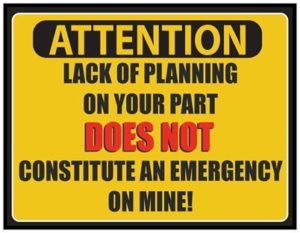

If you have ever worked in an office, you may have seen this sign before. It’s pretty funny, unless you’re the person with the emergency. In another blog I wrote about spending a dollar on a candy bar, which is reasonable. And if you saw that candy bar for $5 somewhere else, you would think that’s ridiculous, I’m not paying $5 for a candy bar. But a person who is really hungry and doesn’t have time for anything else may not have a choice but to pay the $5 to meet that immediate hunger need. That is poor planning. Because this person didn’t anticipate that he/she may be hungry while traveling, running errands or what have you, s/he had to pay top dollar for something that is usually pretty cheap.
Of course we all have unanticipated real emergencies that call for us to take drastic action. I got caught and I’m still kicking myself. I moved to a new condo and neglected to have the air conditioner checked out. So it broke on a 90+ degree day, and on a Saturday, so I had to pay a huge surcharge if I didn’t want to broil until Monday. It happens to all of us. We can all find ways to become better planners.
Here are some ideas on how to be a better planner, which will help lower unexpected and unnecessary expenses.
Food Emergencies
I always have nuts available. Nuts are easy, you can keep them in your purse, your briefcase, at your desk or in your car. Breakfast bars are another option. I keep cans of soup at my desk, along with a bowl and spoon, so if I forget my lunch I’ll have that to fall back on. The key is to try to eat fresh, but always have nonperishable options available for emergencies.
Maintenance and Unexpected Expenses
Dave Ramsey says to always have a $1,000 emergency fund. If that sounds hard for you, start slowly, your savings will grow. Save what you can. I put change in a piggy bank at the end of the day, and it’s always a pleasant surprise to find that that small bank holds over $80 when I take it to the bank. I deposit that money into savings to use for emergencies. This will stop me from robbing Peter to pay Paul – if my car or air conditioner breaks, I can still pay my electricity bill and other necessary bills.
Preventive maintenance is usually cheaper than major repairs (as I learned when I paid the weekend fee to have my air conditioner fixed). This is true on cars, homes, and other items that are needed and expensive to keep up or maintain.
Fees
Watch out for them and don’t pay them! We avoid most fees by paying our bills on time, watching our bank balances so we don’t overdraw, only withdrawing cash from ATMs approved by our banks, not having to take out unexpected loans, and being careful where we bank. I was with the same bank for 20 years, and they suddenly decided to charge a monthly fee on my checking account. Because I am careful with money, I had options. I closed my accounts immediately. They “hated to see me go,” but I asked why I would pay a monthly fee when I have access to a bank with no fees. Shop around to avoid fees of all kinds.
Interest
When we pay interest, we are paying more for something than it’s value. If you buy a $25,000 car at 3% interest for 60 months, you are actually paying over $27,000 for the car. If you use a credit card to buy something and you don’t pay it off every month, you are paying hundreds more for whatever you bought – whether it’s groceries or car repairs. Try not to pay interest. Pay off debt. This can be done with proper planning. The goal for all of us should be to have NO debt. You need your money more than banks do, so keep you money. Buy only what you can pay cash for. Once you are debt free and you are saving more money, you will find that it is possible to pay cash for cars and even houses. And if you have cash, you can probably get that $25,000 car for $23,000 or less.
Vacations and Entertainment
These things are perfectly fine if you are prepared for them. If vacations and eating out are interfering with your ability to save money for the future, then it may be time to cut back. If you do want to have fun, plan for it financially. Budget for vacations and for eating out. You will enjoy it more knowing that it’s not eating away at your savings or preventing you from doing necessary home or car maintenance.
As I’ve written before, making money doesn’t make us wealthier. I had a boss who earned over $100,000/year and she lived from pay check to pay check. I worked with someone else who earned around $40,000/year and retired at 50. The difference is, he planned what to do with his money. It’s all about the planning.